Futurama has defied networks and science over the course of its 10-season run, rearranging the laws of nature and resurrecting not only many beloved characters (after killing them off horrifically) but also the show itself… twice.
Futurama was populated by an endearing crew of jerks and losers that formed the backbone of the series and solidified fan attachment, but the tender love for science—even when it’s being dismantled and improbably rearranged by the Harlem Globetrotters—that permeated every episode and many a joke brought fans hours of joy, both in watching and later in crunching numbers while balancing equations to test the validity of such outlandish claims. Sit back and enjoy a deep-dive into the science of the show!
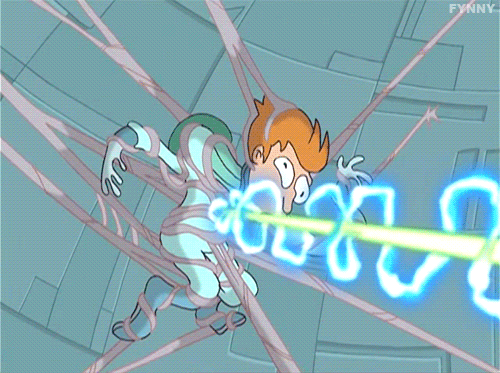
(Fox Television)
By the end of Futurama’s tenure, the speed of light has been increased, our characters are living in the 3rd cycle of the universe (half of them are clones anyways), years are one week longer due to a shift in the Earth’s orbit, the Earth is rotating in the opposite direction, Dark Matter has both dominated as a main fuel source and been rendered completely inert, and a handful of historical events have been irrevocably altered thanks to time travel—and that’s just a small handful of the stuff I understand!
Across the World Wide Web you can find multitudes of science-minded folk debating the legitimacy of Futurama’s scientific endeavors, complete with theoretical discussions and the math to back it all up. I am not one of those people. Casually scientific, most of the physics jokes resonate in a “that was definitely a science joke but I don’t really get it” kind of way. Stumbling upon intense, logistically argued discussions is absolutely fascinating though thoroughly confusing. While I’ve got to leave following the scientific pathways of these occurrences to those who have dedicated the years and tears to untangling the depths of science, there are many huge universe shifts that even the most casually scientific (like me) recognize immediately as a huge shake-up to the universe as we know it.
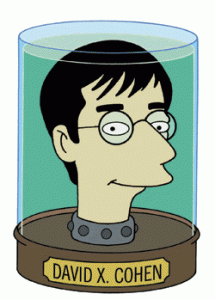
(Fox Television)
As if launching the show 1000 years into the future and adapting all of the big ways the world would have changed across that leap wasn’t enough of a departure from today’s reality for sci-fi comedy Futurama, the show consistently finds ways big and small to mess with how the universe operates. Oh, and of course, as show-runner David X. Cohen holds a bachelor’s degree in physics from Harvard and a master’s degree in computer science from UC Berkeley, the validity of such universe-altering remained an important factor whenever the creative team decided exactly how far they could warp the concepts of science. While comedy may have taken precedence, allowing the show to stretch the limits and engage in outlandishly unrealistic rules, science was never far behind, woven seamlessly in to create a show that marries comedy, emotionally compromising character arcs, and sci-fi at its best. In fact, many of the show’s scientific gags are firmly rooted in measurable science. They’ve even created a viable mathematical theorem to explain the mechanics of mind-switching for the episode “The Prisoner of Benda”.
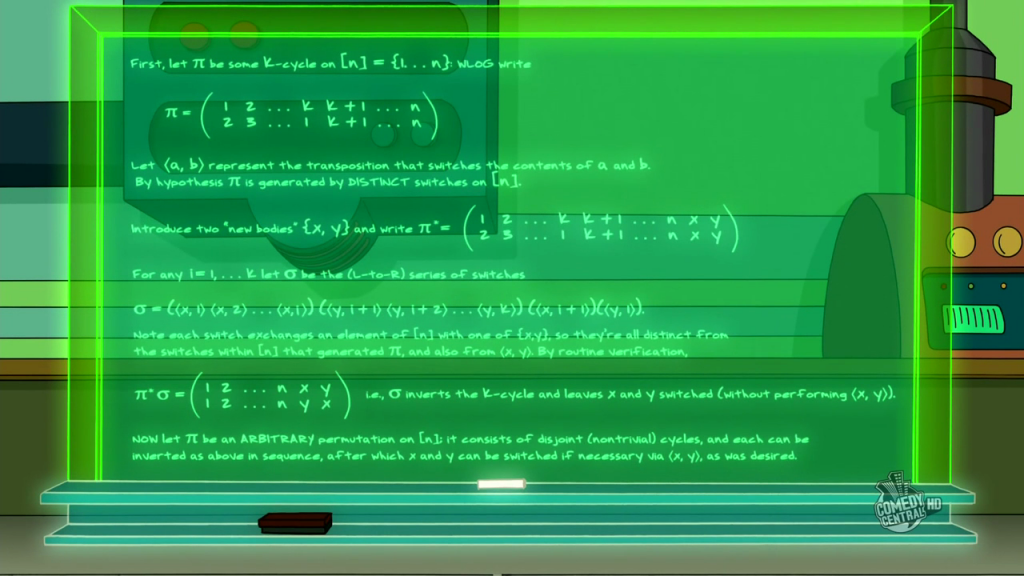
(Fox Television)
Traditional limitations like the speed of light and other mysteries of the scientific world don’t frighten this writing team, who explore alternate realities, chronitons, gamma radiation manipulation, and a slew of other challenging hypothetical topics without fear. Futurama barrels past the pesky issue of traveling faster than the speed of light by…well, increasing the speed of light. By localizing the increases and constructing specific pathways that utilize that technology, future scientists managed to secure a faster route of travel. This is one of Futurama’s earliest established rules to warp the laws of time and space, bypassing the impossibility of interstellar travel to set the stage for Planet Express’ ability to business.
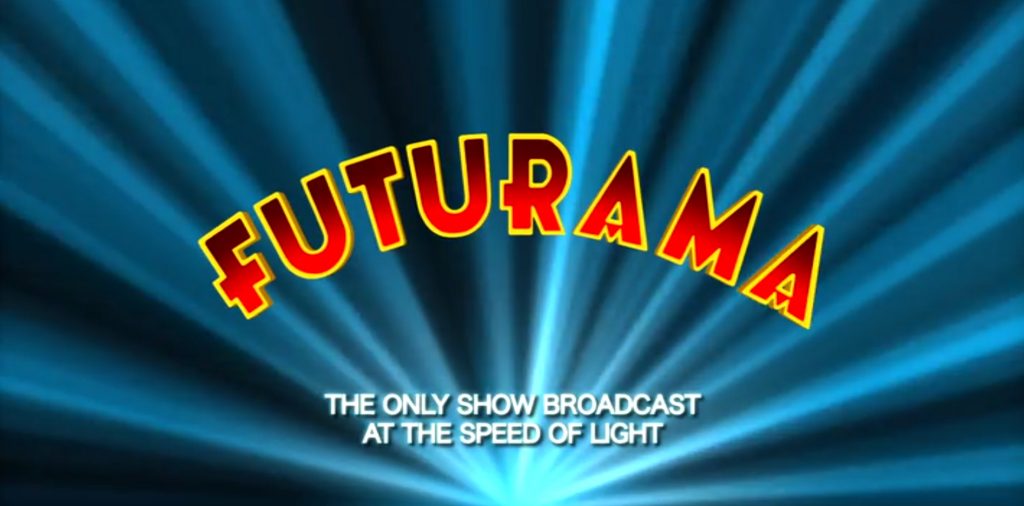
(Fox Television)
For a show that preaches time travel abstinence, it’s surprisingly how often Fry and the gang end up careening through time. Often enough to seriously screw with the universe, at the very least. Most of the forays into time travel remain relatively self-contained, affecting the crew directly involved but not seriously shaking the foundations of the universe. In one memorable episode, one Philip J. Fry inadvertently becomes his own grandfather. Another more convoluted escapade into time travel creates a universe in which Professor Farnsworth assassinated Eleanor Roosevelt. Sure, there have been a few time paradoxes that threaten to unravel the very fabric of space here and there—but they always get figured out. This is a comedy, remember?
Pr. Farnsworth’s forward-traveling time machine, created and experimented with in “The Late Philip J. Fry”, does manage to affect the universe at large, since a slip of the hand propels Fry, Bender, and the Professor much further into the future than anticipated, leaving their former lives and loved ones far behind. Though they first attempt to travel forward until they discover a time period in which backwards time travel has been invented, they soon end up far past an inhabitable point in time. Time to kick back with a cold one and watch the universe collapse, right? Yup. Luckily, as they fast forward through the collapse of the universe, a second Big Bang kicks into action, spawning a new, identical universe. After a second miss, they decide to bring it around once more, and in the 3rd universe’s iteration they successfully make it back to their original posts.
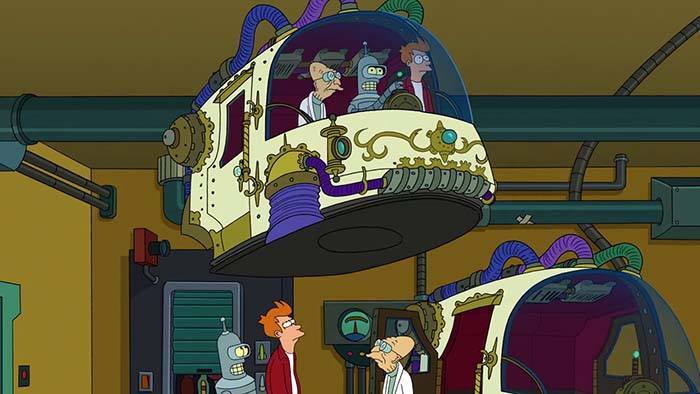
(Fox Television)
As the 3rd universe is 10 feet lower than their original universe, the machine’s fall from its original orientation kills the Fry, Farnsworth, and Bender of this 3rd universe, allowing the trio to slip seamlessly into this universe with no pesky paradox issues.
But we all know that time travel messes things up in big ways, as it’s a common trope in the sci-fi world. Little good ever comes of time travel. Nah, it’s the more ‘mundane’ ways of slightly altering the laws of space and time that really push this reality away from our own. Like how the world’s solution to global warming was to have Earth’s population of robots collectively point their exhaust vents in the same direction and propel the Earth further away from the sun, thus reducing solar radiation, stopping global warming, and lengthening every year by one week. That’s right, the thirtieth century enjoys a 53rd week in their year, aptly named “Robot Party Week”. And for those interested in going deeper into the physics behind this one, you can!
But who cares about all that pesky science anyways? We all know that the Hypnotoad is truly Futurama’s most valuable takeaway in the grand—ALL GLORY TO THE HYPNOTOAD.



